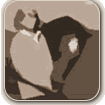Jennifer MacKenzie is an agricultural photo journalist with almost 30 year's experience. Operating from her base in Cumbria, Jennifer undertakes mainly industry-related freelance writing and photography.
Hallfield Blondes
Consistency of breeding has helped one of the UK’s longest-established
pedigree Blonde herds win the breed society’s annual herd competition
for the second time.
Hallfield Blondes was established in 1974 with the purchase of three heifers from France by Peter Weightman. All 50 of today’s breeding cows now run by Peter’s son, James, have been bred from these females, the only new bloodlines being brought in through AI sires and latterly stock bulls.
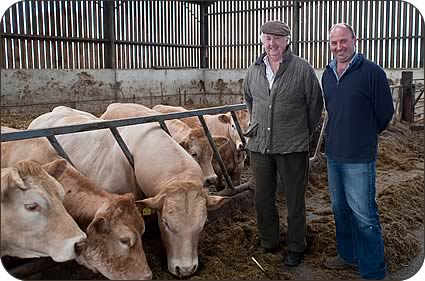 |
| Peter and James Weightman |
Looking for consistency, quality and strength and depth, the judges of the Blonde Society’s national competition, Essex breeder Ian Calderbank and David Knight, from Bristol, selected Hallfield Blondes as the competition’s best large herd as well as its overall winner. Winner of the North East England regional club contest on a number of occasions, the herd last won the national award in 2002.
Originally established as a hobby with breeding cow numbers running at a dozen for a number of years and served by AI, it was in 1998 that the Weightmans bought their first stock bull, Ballygowan Noble.
Cereals have been the main enterprise on the 360 acre Hallfield Farm, near Easington, Peterlee, with three quarters of the ground down to wheat, barley and oil seed rape and the remainder heavier ground permanent pasture.
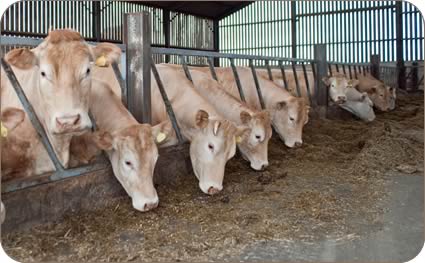 |
| Autumn calving cows |
But since the purchase of the stock bull cow numbers have risen steadily to the current optimum of 50 cows, with further expansion still a possibility depending on the price of cereals, all of which are sold, with the exception of some barley for feeding the cattle.
Noble was bought for 4,000gns at the society’s Carlisle sale and he has improved the consistency, conformation and the temperament of the cattle. Many of the older cows are by him.
The herd’s most recent stock bull, Blackwater Ainsley, was bought for a breed record price of 8,500gns in Carlisle in March 2007.
“I wasn’t looking for a stock bull on the day but Ainsley caught my eye because of his width and conformation as well as having a very good temperament which he has passed on to his calves,” said James.
“For anyone working with numbers of livestock, temperament is very important and Blonde breeders have worked hard to improve this as well as consistency of what they produce,” added James, a former society and club chairman.
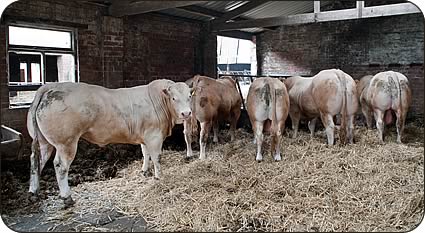 |
| Bulls going to the Carlisle May sale |
Selected primarily on looks but backed up by above average figures, Ainsley has already proved James’s initial judgement with his first batch of sons selling to a top price of 7,000gns in Carlisle in March 2010 for the 21-month-old Hallfield Designer, out of Hallfield Pandora, a Whistley Dollar daughter. The buyer was pedigree and commercial breeder Mike Harrison, of Sleddale Hall, Wet Sleddale, Shap.
A total of 10 bulls in the batch sold both through the ring and privately averaged £4,000, purchased by pedigree and commercial breeders.
Ainsley semen has been sold as far afield as Canada, Australia, Germany, Czechslovakia and Ireland.
This is the second Hallfield bull to make 7,000gns - 10 years ago, Rommel, a Ballygowan Noble son made the same price at Perth in 2002.
At the March 2010 Carlisle sale another Ainsley son was the second highest priced bull at 5400gns. Hallfield Empire was also the senior champion.
While herd numbers have been increasing few breeding females have been sold, but generally they are sold privately.
The Weightmans have a strict culling policy with any animals which are narrow, have poorer temperament or are incorrect or plain going through the ring at Darlington Mart.
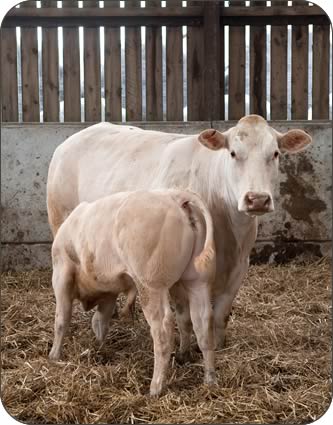 |
| Cow with Autumn born calf |
Cows sold through the prime ring have made up to £1,400 with bulls selling for £1,500 and heifers £1,200. Animals that James has been able to follow through to slaughter have had excellent killing out percentages of between 65 and 70 per cent.
Blondes are quite capable of breeding and producing a calf every year at up to 12 years old with the oldest cow in the herd still producing calves at 16
Both pedigree and commercial breeders come back to buy Hallfield bulls. As well as consistency, James says the Blonde is an easy calving bull because it is a fine-boned breed and not too big on the shoulder - the majority of cows at Hallfield calve without assistance.
While James places just as much importance on the visual appearance of pedigree Blondes, the herd is Signet recorded, providing a further marketing tool for stock for sale.
The Blondes achieve a good weight for age, with Hallfield bulls generally weighing around 650kg at 400 days old. One of the batch of seven Ainsley-sired bulls for sale at the May 14 Blonde society sale in Carlisle is over 900kg at 17 months old.
Conscious of ever-increasing demands for cattle with a high health status, the herd is in the SAC Premium Health Scheme and it has tested clear for both BVD and Johnes disease.
A third of the Hallfield cows calve in the autumn from October to December with the remainder starting from the end of March onwards, making best use of the spring grass at turnout weather-permitting at the end of April.
The herd is run much along the lines of a commercial suckler herd, with spring calvers fed over winter on limited silage and straw and the autumn calvers receiving ad lib silage and some meal.
James as a member of the society’s council for eight years following in the footsteps of his father had demonstrated his faith in the Blonde breed.
“While the demand for beef bulls of all breeds has levelled out because the industry has contracted, I’ve found I’m still able to sell more bulls each year,” said James.
“The income from the Blondes balances out with the cereal enterprise at Hallfield which has been doing well. But if I can maintain the levels of sales of pedigree bulls I have been achieving, with a good number selling over 4,000gns, then I’m more than happy to run the present number of breeding females,” he added.
